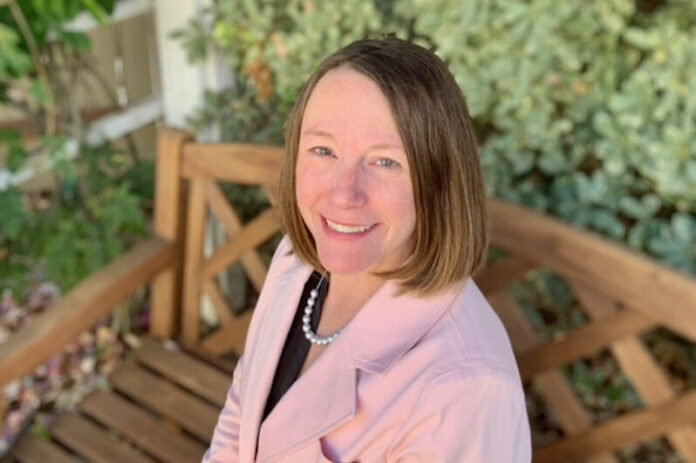Margaret Sluyk is new director at Reach For Home
No one signs up for the fight against homelessness without knowing they are also signing up for lots of frustrations, up and down emotions, public conflicts and good deeds that go unnoticed.
Still, Margaret Sluyk said she was delighted to be selected as the new executive director for Reach Fore Home, the north county’s nonprofit homeless outreach and shelter program. She is preplacing outgoing director Colleen Carmichael, who announced her resignation last July.
“We have to celebrate the small victories and share the stories of success when we have them. Sometimes it is just having someone finally talk to us and finally opening up their trust,” said Sluyk, a 17-year veteran of business development and nonprofit leadership. Most recently she was a regional manager for Canine Companions for Independence in Santa Rosa, where she currently resides.
“I know there is an immense need and there are incredible people trying to solve this (homeless) problem. I was looking for something more local to do, where I could really make a difference,” said Sluyk. She said she has met some of those amazing people at Reach For Home on the small staff and volunteer board of directors and was “honored” to be asked to join. “I’ve been learning from Colleen and hearing from the community. Colleen brought such a spirit here and I hope we always keep it to build our partnerships, collaborate and keep thinking outside the box, the way Colleen always did. She was tenacious.”
“Margaret was the board’s unanimous choice to lead Reach For Home into the next stage of our mission of eliminating homelessness in the north county,” said Mona Hanes, chair of the nonprofit’s board of directors.
Carmichael led Reach For Home through a period of growth and organizational maturity for six years, increasing the annual budget, hiring paid staff, expanding the board of directors and building shelter and housing assets now over $2 million in various north county communities. She announced her resignation in July and has plans to pursue work in the area of trauma prevention and treatment. Her vision is to create a global organization of school-based programs that can serve as a model for other institutions and nonprofits.
Reach For Home operates with a $1.6 million annual budget and has a paid staff of seven involved with homeless outreach, street medicine, permanent support housing, rapid rehousing and emergency shelter support through the St. Paul’s Episcopal cold weather shelter, weekly dinners and daily shower programs. Twelve volunteers from Windsor, Healdsburg and Cloverdale serve on the board of directors.
The work at Reach For Home is unending even though the nonprofit and a Northern Sonoma County Homelessness Planning Task Force has set a goal to end homeless here by June 2025. The homeless population for north county was 209 when the annual Point-In-Time count was taken in February 2020. (The task force has suspended monthly meetings since last April due to the COVID-19 social distancing restrictions.)
The nonprofit is working with the city of Healdsburg, Burbank Housing Development Corp. and others to acquire or build housing and shelters for specific homeless populations. The nonprofit owns over $1 million in properties in Cloverdale, Healdsburg and elsewhere in north county.
Sluyk joins a core team of Ana Rangel and Laurie Mitchell at their cramped office space on Hudson Street in Healdsburg. Outreach workers include registered nurse Jaclyn Ramirez, Rick Cafferata and Jim McCannon. With the voters’ approval of Measure O in November, a quarter-cent sales tax to fund expanded mental health and homeless services, Sluyk is hopeful the Reach For Home staff might be increased.
“We know we qualify for some of the buckets of funds but we don’t know the outcome yet,” she said. Measure O is anticipated to raise $25 million annually for a series of mental health services, added staffing and funds for homeless shelters and new outreach staff.
The nonprofit just completed their largest annual fundraiser, a virtual Dinner in the Vineyard, which Sluyk called a “huge success” with individual and matching donations reaching the event’s money goals.
A current charity campaign to raise $90,000 for the purchase of a mobile van for outreach and emergency services now stands at $70,000 as a final push is underway to put some new wheels under the Reach For Home team.
Right now, Reach For Home staff and county homeless workers are addressing a highly visible homeless cluster of roving RVs, occupied cars and tents in the downtown area of Healdsburg. Rustled from an encampment at the northern border to Healdsburg in October, a half dozen or so homeless individuals first relocated to the Highway 101 underpass at Mill Street. That location was cordoned off by CalTrans crews with heavy boulders and the wheeled caravan moved to the West Plaza parking lot used on Saturdays by the Farmers Market. Currently to RVs and other belongings are located on city property at the Cerri Building on North Street, just east of City Hall.
“We are definitely part of the outreach process and we have been giving them tools to keep their area clean,” said Sluyk. “We are keeping up communication and hope some of the people will eventually accept available services. So far, we haven’t reached any long term solutions.”
Most successes at Reach For Home come one person at a time, one person’s turnaround story or lifesaving moment, often going untold, such as the story of one third-generation homeless man who finally earned a Section 8 federal housing subsidy to have his own apartment after several years of living on local streets and in the bushes. Arriving late to this story, Sluyk was there to celebrate its happy ending. “No one ever gave up on him. That’s how it works, but it takes time.”
61.6
F
Healdsburg
April 19, 2025








